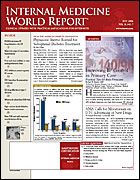Publication
Article
Internal Medicine World Report
Prehospitalization Antibiotic Use in Suspected Meningitis Questioned
Author(s):
British Medical Journal
Conflicting and inconclusive data on the effects of administering antibiotics to patients suspected of having meningococcal disease before they are admitted to the hospital have been reported in 2 studies recently published in the .
BMJ
The first was a large, national, case-control study that included 158 children (aged 0-16 years) who were diagnosed by a family physician with meningococcal disease before being admitted to a hospital (. 2006;332:1295-1298). Data included parent questionnaires, telephone interviews with primary care physicians, primary care records, hospital referrals, and filed complaints. Disease-severity analysis was based on parental reports of the progression of symptoms, illness severity and the provisional diagnosis made by the primary care physician, illness severity at admission, and the time delays at each stage.
Illness in the primary care setting was considered severe if ≥1 of these situations were involved: emergency services or ambulance call, circulatory collapse, or loss of consciousness.
Severity of illness at hospital admission, assessed using the Glasgow meningococcal septicemia prognostic score, was available for 116 children. Information on complications (ie, renal, cardiovascular, or respiratory failure; neurologic complications; tissue necrosis requiring excision or amputation) was available for 108 children.
After adjusting for confounding factors, those who had received preadmission penicillin (n = 105) had a 7.4 times increased mortality risk and a 5 times greater risk of complications compared with the 47 children who had not received preadmission penicillin.
BMJ
The second study (. 2006;332: 1299-1303) reviewed 14 observational studies. In the 5 studies that included data on prehospital oral antibiotic therapy, such treatment was associated with reduced risk of death.
Of the 12 studies with information on prehospital parenteral antibiotic therapy, 8 showed beneficial effects (but significantly so in only 1), and 4 showed detrimental effects. Even in studies that classified patients according to illness severity, preadmission parenteral antibiotic therapy was shown to reduce mortality in 2 studies but increase it in a third study.
Why the discrepancies? In an editorial in the same issue of BMJ (pages 1295-1296), Duncan Keeley, MD, The Health Centre, Thame, United Kingdom, remarked that it is routine for primary care physicians to “carry penicillin in our bags” for the express purpose of giving it to patients suspected of having meningococcal disease. However, although it seems logical that it would be beneficial, “not everything that stands to reason proves to be the case.”
Should your practice of prehospital parenteral penicillin change? Dr Keeley says, “On the basis of this study alone, probably not.”






